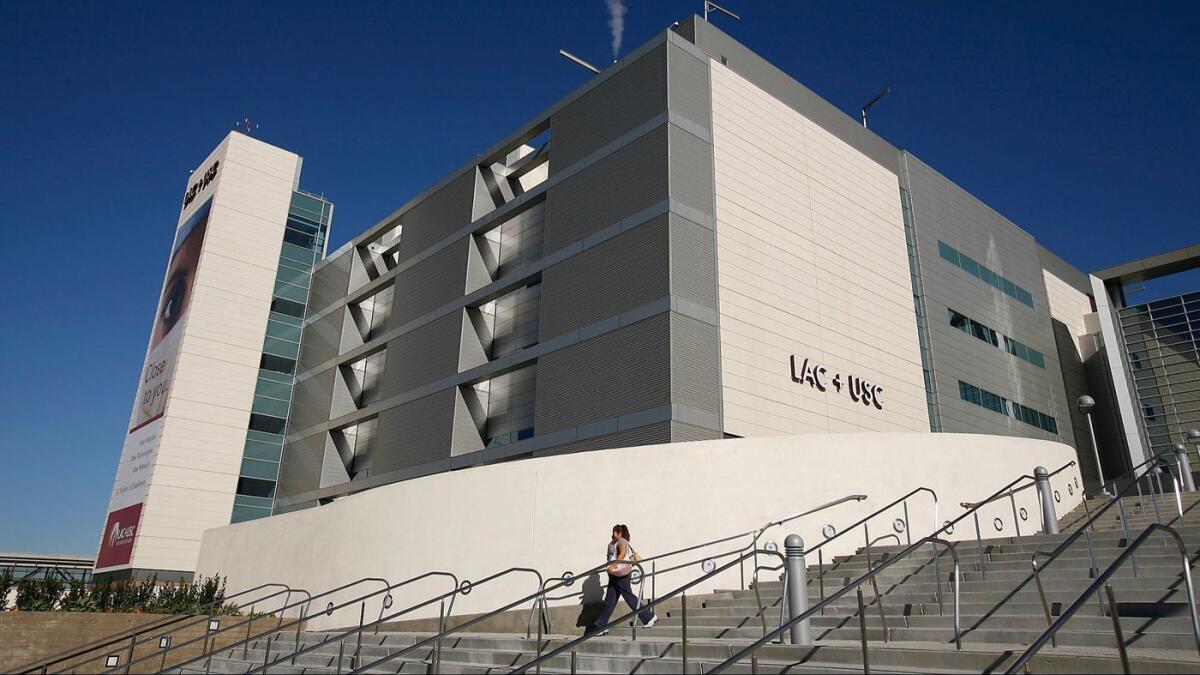USC cardiovascular fellowship to be stripped of national accreditation, in major setback

A national oversight panel has moved to revoke the accreditation of the USC medical school’s fellowship in cardiovascular disease, an embarrassing blow to the once-vaunted training program.
The Accreditation Council for Graduate Medical Education formally notified USC and L.A. County this week that their jointly run fellowship program will lose its accreditation next year, effectively shutting it down.
The panel did not publicly state the reasons for the action. But it comes a year after revelations that a medical resident had accused a fellow in the program of sexual assault and alleged officials didn’t take her case seriously.
The ACGME also took the rare step of imposing immediate probation on the fellowship’s sponsoring institutions, USC and the L.A. County-USC Medical Center, concluding they “failed to demonstrate substantial compliance” with unspecified requirements.
During the 2017-18 academic year, the ACGME had only one institution on probation out of the 830 accredited in the U.S.
The USC and L.A. County partnership runs more than 60 residency and fellowship programs with nearly 1,000 training physicians. Although those other programs remain accredited, the probation suggests that the panel is concerned about the larger medical institution and its oversight of residents and trainees.
The actions come as USC is struggling with several scandals, including allegations that wealthy parents cheated to get gain admission for their children and a criminal investigation into the longtime campus gynecologist accused of sexual misconduct against generations of female students.
The accreditation decision was announced Thursday in a memo to faculty by Dr. Laura Mosqueda, dean of USC’s medical school, who said the moves were based on outside experts’ concerns about “resident safety and wellness processes.”
The accrediting organization found a lack of “substantial compliance” in three general areas at the cardiology fellowship: the work of the program director, professionalism and the overall well-being of residents and faculty, according to interviews and a USC administrator. Susan White, a spokeswoman for ACGME, said the finding could not be appealed, adding that “this is a final decision.”
Changes to the fellowship take effect in June 2020, allowing two classes of current fellows to graduate. The selective program has 15 slots for the three-year curriculum, and its elimination would drastically disrupt how L.A. County-USC Medical Center cares for heart patients. USC said it would “hopefully” reopen a new cardiology fellowship program before the current one must close.
Troubles at the cardiovascular disease program came to public light in 2018, when The Times reported that Dr. Meena Zareh alleged in a lawsuit against USC and L.A. County that when she was a medical resident, Dr. Guillermo Cortes, a fellow, cornered her in a hospital room, reached under her scrubs and violated her. After The Times reported on the lawsuit, two other female colleagues came forward and made sexual assault allegations against the physician, according to state medical board filings.
Cortes’ defense attorney said last year that his client “vehemently denies the allegations and charges presented to the medical board…. Once all of the evidence is presented, Dr. Cortes’ name and reputation will be cleared of these false accusations.”
Zareh, who is listed as a cardiology fellow in the program, said she did not report what happened to administrators until three months later because she feared retaliation, especially because Cortes’ half-brother is a USC faculty member and was also a director of another cardiology fellowship program.
Zareh said in her lawsuit that county and USC administrators failed to properly investigate the incident and ultimately retaliated against her. She alleged in court papers that one of her mentors dismissed the incident, saying to her, “You knew what you were doing.”
Zareh was unavailable for comment, and her lawsuit is still pending. Her attorney, Leslie Levy, said Thursday that her client was not the source of the complaint that brought ACGME’s experts to investigate the program.
“There is no one to blame but the people in power who had the ability to correct the inequities and failed to do so,” Levy said in a statement.
County Supervisor Hilda L. Solis said in a statement Thursday that she was disappointed by the panel’s decision. “But I am fully committed to ensuring that there is no interruption of cardiology services at LAC+USC Medical Center,” she said.
Christina Ghaly, director of the L.A. County Department of Health Services, said in a statement to The Times that officials were already working to improve the fellowship and residency program when they learned about the accreditation decision.
“We are fully committed to working with the ACGME and USC to take every action necessary to restore our standing for all residency training programs,” she said. “We are determined to deliver an exceptional training environment that is safe and inclusive for every physician completing graduate medical education at LAC+USC and our other teaching hospitals.”
As for the Zareh case, the department said in a statement that it “takes all allegations of inappropriate conduct seriously. When it learned of Dr. Zareh’s allegations, DHS took immediate and appropriate actions in response.”
The fellowship’s loss of accreditation is the latest setback for USC’s medical enterprise. The Times revealed in 2017 that the dean of USC’s medical school, Dr. Carmen Puliafito, was abusing illicit drugs with a circle of younger addicts while tasked with running the school. He denied wrongdoing. His successor as dean was appointed despite previously being accused of sexually harassing a graduate medical fellow while he was a junior professor supervising her work, The Times reported. Mosqueda took over after he stepped down.
Twitter: @MattHjourno
More to Read
Sign up for Essential California
The most important California stories and recommendations in your inbox every morning.
You may occasionally receive promotional content from the Los Angeles Times.











